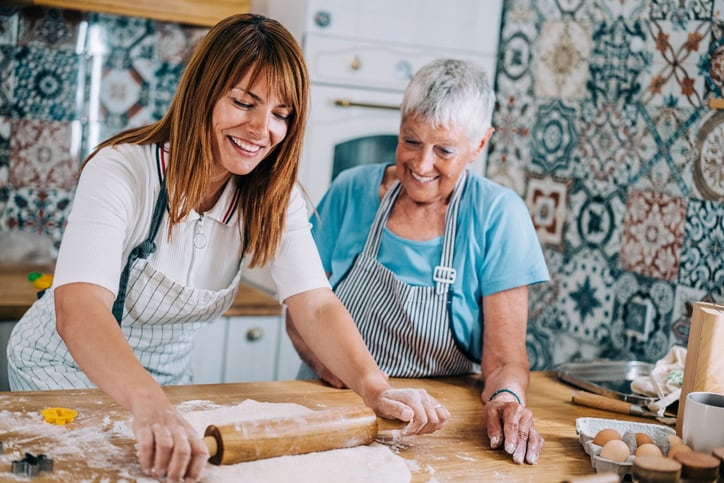Whether you’re a seasoned senior caregiver or new to the field, you’ll want to go into an interview as prepared as possible, as it’s not something families take lightly.
“When family members seek home health care services for their loved ones, they are committing to entrusting a caregiver with entering their loved one’s personal home and taking responsibility for their loved one’s health and quality of life,” says Rocco Aquino, the director of field recruiting for BAYADA Home Health Care, an international nonprofit home health agency based in Philadelphia.
From the qualities families look for to the questions you can expect to be asked — and those you should ask your potential employer — here’s what you need to know to ace your next senior caregiver interview, whether it’s with an agency or family.
Preparing for a senior caregiver interview
Before you have your phone or in-person interview, there are a few ways you can get ready. Tim Murray, the CEO and co-founder of Aware Senior Care, a home health agency that serves seniors in North Carolina, frequently interviews caregivers to place with seniors, and he says it’s crucial for caregivers to closely study the job description and familiarize themselves with it before the interview.
“Make sure you know the job requirements inside and out,” he says.
“Make sure you know the job requirements inside and out.”
—Tim Murray, CEO of Aware Senior Care
Be sure to dress professionally, Murray adds, and when the time comes for your interview, be punctual, if not early.
What families look for in a senior caregiver
Consider the characteristics families most often look for when hiring a senior caregiver. Then, ensure your outlook and answers reflect the following qualities.
Respect for the family and elder
The process of seeking a caregiver is a very vulnerable time for a family, Aquino says.
“Their families are seeking an in-home caregiver so their loved one can remain in the comfort of their home with dignity and independence,” he says. “As they seek out a caregiver to rely on, they need to know this person is respectful of the uniqueness and complexities of their care. Having respect for someone in the most vulnerable state of their life, but helping them to continue to feel ‘normal’ and whole, is essential.”
A positive attitude
Families often desire caregivers who will be a cheerful, positive presence in their older loved one’s life.
Eli Kershaw, a Vermont-based caregiver with decades of professional experience and author of the book “If I Die Before I Wake: A Caregiver’s Journey,” encourages caregivers to leave their baggage at the door, even if they’ve had a horrible day. “It’s your bad day and nobody else’s,” he says. “If you walk in and you’re tired, they don’t want to hear that; you’re there to cheer them up and make them feel better.”
“If you walk in and you’re tired, they don’t want to hear that; you’re there to cheer them up and make them feel better.”
—Eli Kershaw, caregiver and author
Murray adds that when a family is hiring a caregiver, there may be tough circumstances at home. “They need help, and it’s hard to accept a complete stranger,” he says.
Reassuring a family that you’ll be “a ray of sunshine” and positive, caring addition to the household can help put their minds at ease, he says.
Relatability
“Family members look for caregivers who they can see and picture spending countless hours a week with their loved ones,” Aquino says.
While having training and skills is definitely important, he says, it’s also crucial that the senior and the caregiver can relate through social interactions.
“That relatability is unique to each family and client, but could include being able to discuss common hobbies, interests, pastimes and sports; enjoying the same meals; having common values and similar social norms, etc.,” Aquino says.
A passion for your work
Murray says his agency looks for passion in a caregiver. Aquino says BAYADA Home Health Care has the same attitude when hiring caregivers for seniors.
“We are very focused on seeking employees who agree with our belief that serving as a caregiver is not just a career, but really more of a higher calling, and I feel that family members would hope the caregiver assigned to their loved one would feel the same way,” Aquino says.
Trustworthiness
“Over time, a caregiver is exposed to some of the most intimate details of a person’s and a family’s life, such as financial information and family dynamics,” Aquino says. “Clients look to someone they know they can trust with some of their closest secrets.”
Questions you should be prepared to answer
While you may be asked any number of questions, here are some common ones you’re likely to face at an interview for a senior care job. Familiarize yourself with them and come prepared with answers.
What is your experience caregiving for older adults?
Cynthia Jackson of Tyler, Texas, has been a caregiver for over 30 years and currently works full-time for a senior couple with dementia. She can attest that interviewers generally want to know what kind of experience a caregiver has. She’s usually asked how much she has worked with dementia patients, given her area of expertise.
While a caregiver with specific experience like this is necessary for certain families, Murray says, don’t be discouraged if you’re a new caregiver. Many agencies and families are willing to give a chance to someone green if they appear motivated, trustworthy, straightforward and honest, he says.
Do you have any professional training or licenses?
Rocco says families often look for caregivers who have training or professional licenses. But it’s not always necessary to land a job. Kershaw says he’s been asked by some interviewing families if he was a registered nurse or LRN, which he’s not. He recommends answering honestly, and then sharing what you are and aren’t comfortable doing. It may be that you still have the skill set and experience they’re looking for, even if you don’t have the letters next to your name.
Why do you want this job?
“Be prepared to discuss why you want the job and reinforce it with a personal story from the heart that speaks to your passion to make a difference in a person’s life,” Murray says.
“Be prepared to discuss why you want the job and reinforce it with a personal story from the heart that speaks to your passion to make a difference in a person’s life.”
—Tim Murray, CEO of Aware Senior Care
For example, he says, it could mean explaining that you cared for a parent or grandparent with dementia and you wanted to give back.
Do you mind changing diapers?
Kershaw says this is one of the questions he’s asked most often. He’s also been asked how he feels about flatulence. For that reason, he recommends that caregivers assess their comfort levels with various tasks prior to an interview.
Scenario-based questions
Some interviewers will ask you to describe a past situation or say how you’d handle a future situation, in order to gauge character. Here are more specific examples of these types of questions, according to Aquino:
- Can you describe a situation where you or a colleague demonstrated exceptional care and kindness to a client or the client’s family?
- Our clients and families rely on us. Can you describe how you overcame a barrier in order to keep your commitments as promised?
- Can you give an example of how you have demonstrated the highest level of skill, competence and sound judgment in your work?
- What would you do if you were late to your assignment or suddenly could not get there?
- What strategies do you utilize to remain focused and calm during a crisis situation?
Questions you should consider asking
A job interview isn’t just a one-way street. You’re also expected to ask questions which will reflect your experience and engagement, as well as reveal information that will help you determine whether this job is the right fit for you.
What are your needs and expectations?
In a private caregiving situation, Murray says it’s important for candidates to ask the family about their needs, in addition to what they expect from a caregiver, since the job description may not give the full story. Kershaw says it helps to get a full sense of what tasks you’ll be expected to do, such as lifting and moving someone, giving baths and changing diapers, so you can decide if you’re comfortable with what’s required.
What are your priorities?
Families might have a laundry list of things they’d ideally like a caregiver to assist with, but it’s wise to highlight what they want you to focus on. Murray says it helps to ask families, “If you could knit it down to a couple things that are very important, what are they?”
How do I fit in?
Kershaw has found that it’s invaluable to try to ascertain “what the family is all about,” including what they perceive the loved one’s needs are, how the family currently takes care of the loved one, and how you, as the caretaker, fit in.
How do you handle specific situations?
If the senior has a mental or physical condition that could create specific challenges, it might be wise to ask how the family handles it or would like you to handle it.
For example, Jackson, who specializes in working with seniors with dementia, says, “I like to ask how or what is their plan of action when issues arise with concerning sundowners.”
What are my benefits?
Whether you’re working with a family or an agency, you’ll want to get an idea of your benefits, such as paid time off, health care, or in the case of working through an agency, insurance or liability coverage that will protect you, says Aquino.
While going into any job interview may be nerve-wracking, familiarizing yourself with these concepts and preparing for these questions can help you ace your interview and land a senior caregiver job that’s an ideal fit. Ultimately, don’t forget to be yourself and show your human side. Interviewers for caregiving positions want to know your story, your passion and your why.

